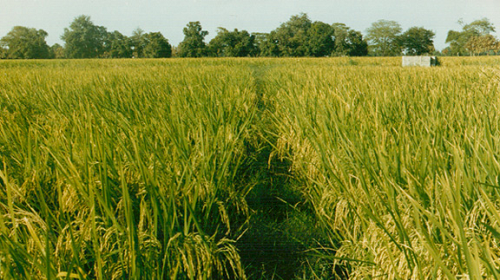N.B. Nair
Hyderabad (ISJ): A team of scientists at the Centre for DNA Fingerprinting and Diagnostics (CDFD) and ICAR-Indian Institute of Rice Research (ICAR-IIRR) have come out with a novel technique to help meet the growing need of high quality hybrid rice seeds. The new method will help to assess the genetic purity of cytoplasmic male sterile (CMS) line (female parent) seeds that are used to produce rice hybrids.
Rice hybrid seed is produced by a process of crossing CMS line, which is male sterile (i.e. do not produce fertile pollen/flowers) with another inbred line, called the Restorer line, which is Male fertile and is genetically divergent from the CMS line.
The CMS line is multiplied by crossing it with its cognate, iso-nuclear male fertile line called Maintainer line, which is male fertile. CMS line and Maintainer line are identical for all traits except that CMS line is male-sterile, while maintainer line is male fertile.
CMS lines are usually admixtured with their maintainer line seeds. CMS line needs to be highly pure and usually a 1 percent impurity in CMS seed-lots gets magnified to 10 percent impurity in hybrid seeds
Purity testing of CMS line is done in field by grow-out test where 400 plants are tested for male sterility at the time of flowering. This is expensive and requires one full season before CMS line can be used in hybrid seed production. Even though DNA marker-based tests are available for assessing genetic purity of CMS seed-lots, they are single-seed based and require analysis of at least 200 individual seeds and are therefore tedious and cost intensive.
The new technique is based on analysis of bulked-seeds, wherein 200 or more seeds can be analysed in one go.
‘’Experiments with this method have revealed that it is simple, accurate and cost-effective as compared to the grow-out test and DNA marker-based tests,’’ said Dr. K. Anupama of CDFD and Dr. R.M. Sundaram of ICAR-IIRR told Indian Science Journal.
Using this method, 20 different seed-lots can be analysed in 2-3 days, while the marker-based method takes more than 10 days to complete the analysis at ten times the cost.
Dr.Anupama however, clarified that not all hybrids are disease-resistant. She said, since hybrids segregate in next generation, it needs to be produced every time by crossing parents unlike inbred lines, which are homozygous developed by repeated selfing.
The collaborative study team has published a report on their work in the journal Electrophoresis.
Image: Archive


